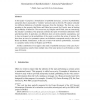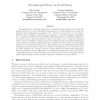56 search results - page 8 / 12 » Anonymity in Voting Revisited |
IFIP
2005
Springer
14 years 1 months ago
2005
Springer
In this paper we propose a formalization of probable innocence, a notion of probabilistic anonymity that is associated to “realistic” protocols such as Crowds. We analyze crit...
ASIACRYPT
2007
Springer
13 years 11 months ago
2007
Springer
A shuffle is a permutation and re-encryption of a set of ciphertexts. Shuffles are for instance used in mix-nets for anonymous broadcast and voting. One way to make a shuffle verif...
WOTE
2010
13 years 5 months ago
2010
Abstract. While electronic elections promise the possibility of convenient, efficient and secure facilities for recording and tallying votes, recent studies have highlighted inadeq...
HICSS
2003
IEEE
14 years 23 days ago
2003
IEEE
Social factors, such as status differences, may prevent some members from participating in group decisions. Computerized group decision support systems (GDSSs) can reduce social i...
TARK
2005
Springer
14 years 29 days ago
2005
Springer
The aggregation of conflicting preferences is an important issue in human society and multiagent systems. Due to its universality, voting among a set of alternatives has a centra...


